Unit 5 Do you have a soccer ball?Section A Grammar Focus-3c课件 (共27张PPT含核心素养)
文档属性
| 名称 | Unit 5 Do you have a soccer ball?Section A Grammar Focus-3c课件 (共27张PPT含核心素养) |
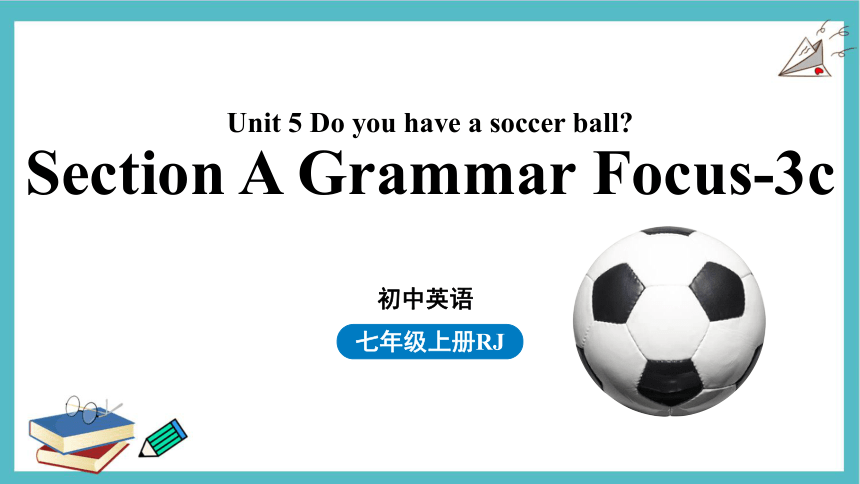
|
|
| 格式 | pptx | ||
| 文件大小 | 22.1MB | ||
| 资源类型 | 教案 | ||
| 版本资源 | 人教新目标(Go for it)版 | ||
| 科目 | 英语 | ||
| 更新时间 | 2023-11-20 00:00:00 | ||
图片预览

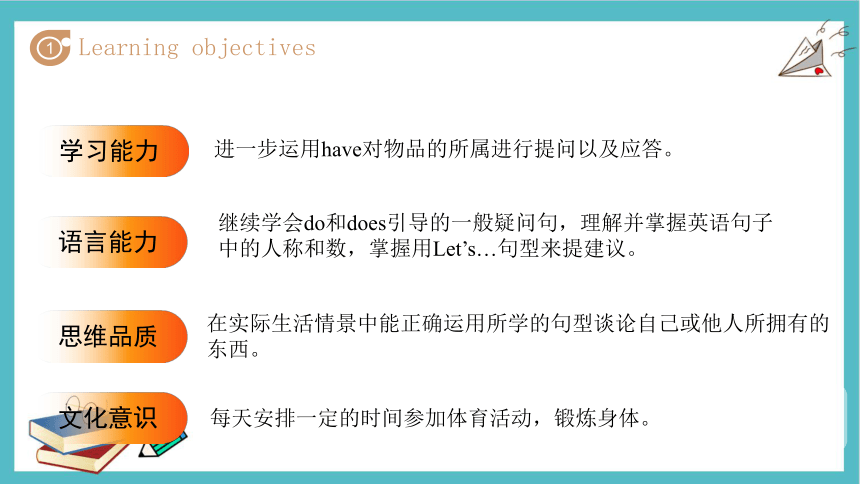
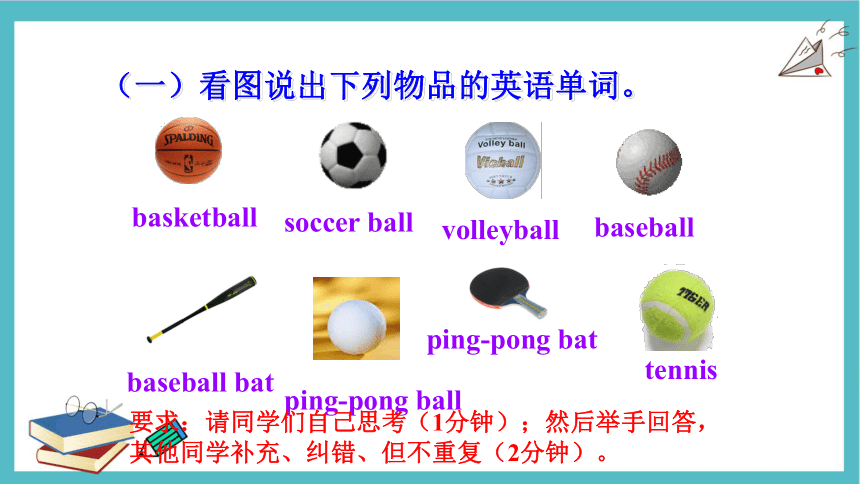
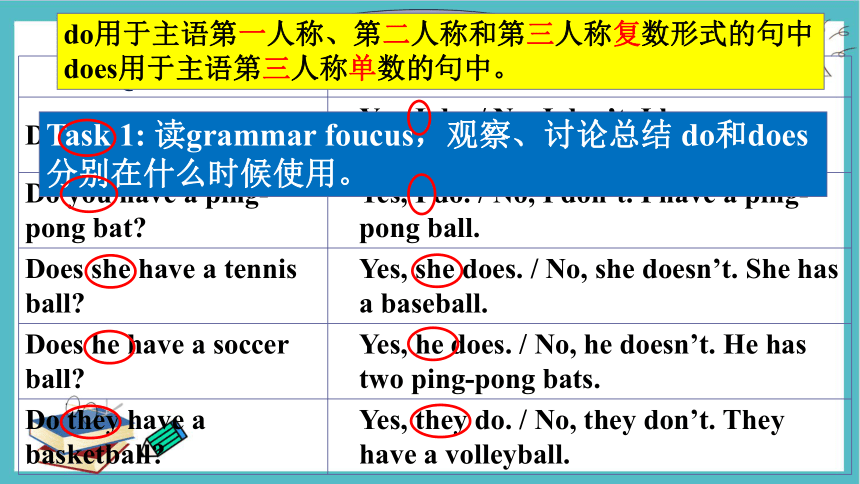
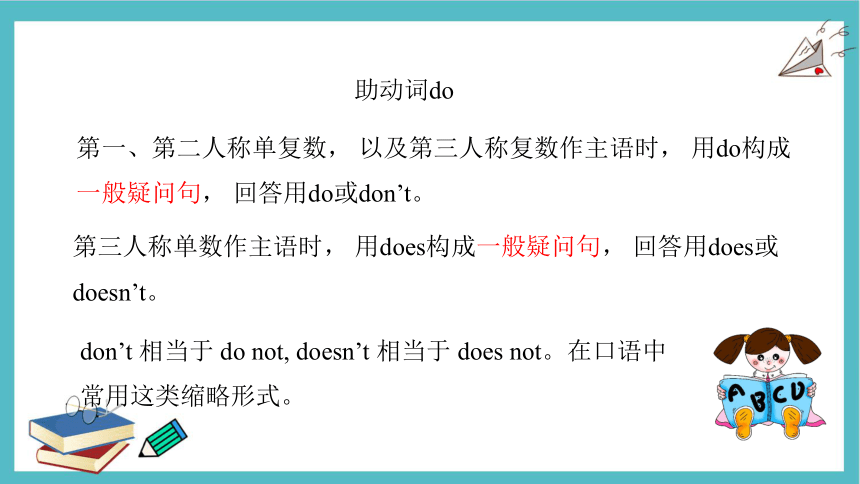
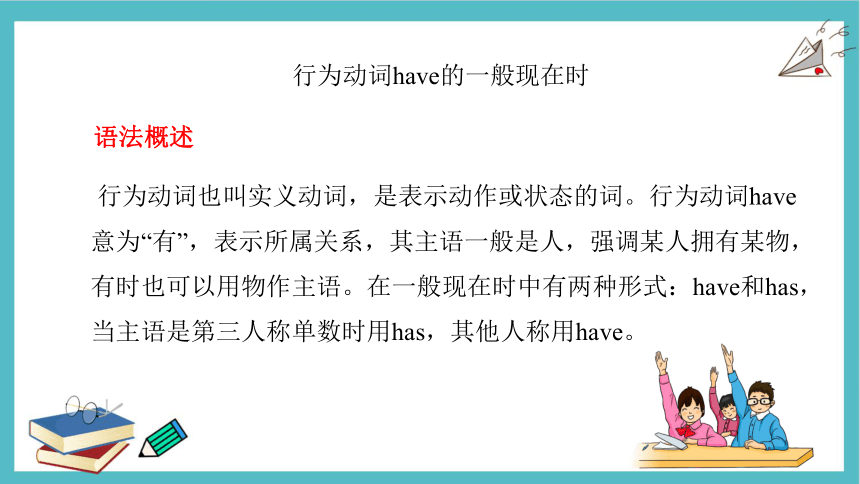
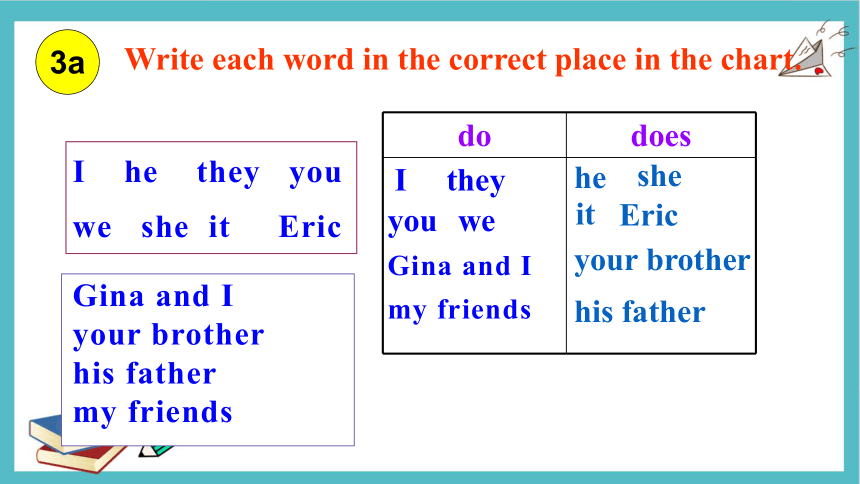
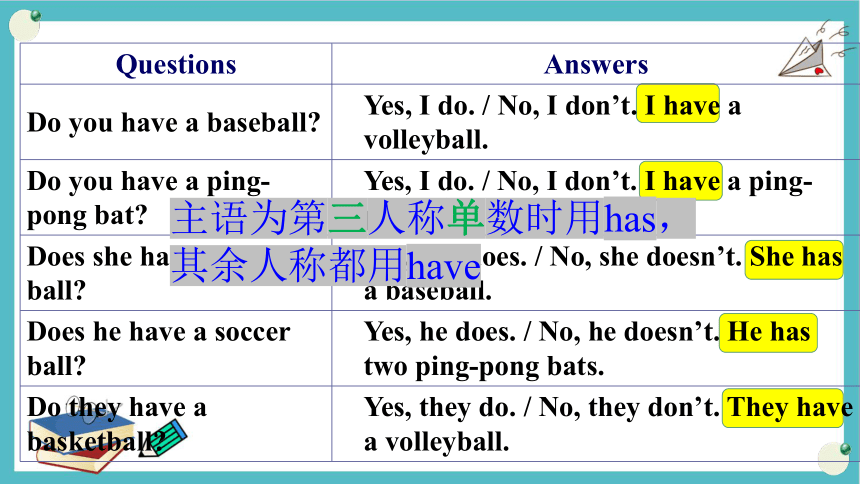

文档简介
(共27张PPT)
Section A Grammar Focus-3c
Unit 5 Do you have a soccer ball
七年级上册RJ
初中英语
进一步运用have对物品的所属进行提问以及应答。
继续学会do和does引导的一般疑问句,理解并掌握英语句子中的人称和数,掌握用Let’s…句型来提建议。
文化意识
语言能力
思维品质
学习能力
在实际生活情景中能正确运用所学的句型谈论自己或他人所拥有的东西。
每天安排一定的时间参加体育活动,锻炼身体。
1
Learning objectives
(一)看图说出下列物品的英语单词。
basketball
soccer ball
volleyball
baseball
baseball bat
ping-pong ball
ping-pong bat
tennis
要求:请同学们自己思考(1分钟);然后举手回答,其他同学补充、纠错、但不重复(2分钟)。
Questions Answers
Do you have a baseball Yes, I do. / No, I don’t. I have a volleyball.
Do you have a ping-pong bat Yes, I do. / No, I don’t. I have a ping-pong ball.
Does she have a tennis ball Yes, she does. / No, she doesn’t. She has a baseball.
Does he have a soccer ball Yes, he does. / No, he doesn’t. He has two ping-pong bats.
Do they have a basketball Yes, they do. / No, they don’t. They have a volleyball.
Grammar Focus
Task 1: 读grammar foucus,观察、讨论总结 do和does分别在什么时候使用。
do用于主语第一人称、第二人称和第三人称复数形式的句中does用于主语第三人称单数的句中。
第一、第二人称单复数, 以及第三人称复数作主语时, 用do构成一般疑问句, 回答用do或don’t。
助动词do
第三人称单数作主语时, 用does构成一般疑问句, 回答用does或doesn’t。
don’t 相当于 do not, doesn’t 相当于 does not。在口语中常用这类缩略形式。
行为动词也叫实义动词,是表示动作或状态的词。行为动词have意为“有”,表示所属关系,其主语一般是人,强调某人拥有某物,有时也可以用物作主语。在一般现在时中有两种形式:have和has,当主语是第三人称单数时用has,其他人称用have。
行为动词have的一般现在时
语法概述
I he they you
we she it Eric
do does
3a
Write each word in the correct place in the chart.
I
he
they
you
we
she
it
Eric
Gina and I
your brother
his father
my friends
Gina and I
your brother
my friends
his father
Questions Answers
Do you have a baseball Yes, I do. / No, I don’t. I have a volleyball.
Do you have a ping-pong bat Yes, I do. / No, I don’t. I have a ping-pong ball.
Does she have a tennis ball Yes, she does. / No, she doesn’t. She has a baseball.
Does he have a soccer ball Yes, he does. / No, he doesn’t. He has two ping-pong bats.
Do they have a basketball Yes, they do. / No, they don’t. They have a volleyball.
主语为第三人称单数时用has,其余人称都用have
(二)完成下表,先写出各人称的主格,然后填空。
人称 单数 复数
第一人称
第二人称
第三人称
I
We 我们
You 你
You 你们
He/she/it
They 他们
Be动词做谓语时,I 用_____, You 用______, is 连着____、_____、______;单数名词用_____, 复数名词要用_____。
am
are
she
he
it
is
are
要求:请同学们自己思考(2分钟);然后举手回答,其他同学补充、纠错、但不重复(2分钟)。
(三)用do和does填空,并将单词填入正确的表格,完成3a。
实义动词做谓语时,I 用_____, You 用______, she、he、it用_____;单数名词用_____, 复数名词要用_____。
do does
do
do
does
does
do
I
he
they
you
we
she
it
Eric
Bob and Eric
要求:请同学们先独立思考(1分钟),不会的可以小组讨论(2分钟),然后自由举手发言,其他同学补充、纠错,但不重复(2分钟)。
Grammar Focus:
肯定句:
否定句:
一般疑问句:
肯定回答:
否定回答:
The basketball is on the desk.
The basketball isn’t on the desk.
Yes, it is.
Is the basketball on the desk
No, it isn’t.
对划线部分提问:
Be动词
Where is the basketball
is not
在英语中,句子中的人称和数需要相对应,谓语动词是实义动词时,需要用动词的单数第三人称形式。谓语动词是be时,如下表:
be 人称 人称代词
am 第一人称单数 I
is 第三人称单数 he, she, it, Mary, Jack…
are 第二人称单数,第一、二、三人称复数 We, you, they, Mary and Jack…
助动词do
第一、第二人称单复数, 以及第三人称复数作主语时, 用do构成一般疑问句, 回答用do或don’t。
第三人称单数作主语时, 用does构成一般疑问句, 回答用does或doesn’t。
don’t 相当于 do not, doesn’t 相当于 does not。在口语中常用这类缩略形式。
数 人称 汉语 主格 助动词
单数 第一人称 我 I
第二人称 你 you
第三人称 他 he
她 she
它 it
复数 第一人称 我们 we
第二人称 你们 you
第三人称 他/她/它们 they
do
does
do
注:除了he/she/it之外,单独的一个人/物(I/you除外),也属于第三人称单数,对应的助动词也用does。
My father doesn't have a car.
我爸爸没有小汽车。
Does the dog have a name
这条狗有名字吗?
英语句子里的人称和数
Grammar Focus:
在原句have前加don’t.
在原句前加do, 然后把原句中I/we 变为you, my变为your.
肯定句:
否定句:
一般疑问句:
肯定回答:
否定回答:
I have a TV .
I don’t have a TV.
Yes, I do.
Do you have a TV
No, I don’t.
对划线部分提问:
What do you have
Grammar Focus:
在原句have前加doesn’t.
在原句前加does
肯定句:
否定句:
一般疑问句:
肯定回答:
否定回答:
She has a pen .
She doesn’t have a pen.
Yes, she does .
Does she have a pen?
No, she doesn’t.
对划线部分提问:
What does she have
have还原
have还原
have还原
Fill in the blanks with do or does. Then practice the conversations with your partner.
3b
A: _____ you have a baseball
B: Yes, I ____.
A: Great! I have a bat. Let’s play!
Do
do
A: ______ John have a soccer ball
B: No, he ________.
A: ______ he have a ping-pong bat
B: Yes, he ______. I think he has
ping-pong ball, too.
A: Hmm… let’s ask.
Does
doesn’t
Does
does
A: _____ your friends have
a basketball
B: Yes, they ____. They
have two basketballs.
A: Well, let’s play basketball.
B: That sounds good.
Do
do
Consolidation
4
Presentation
3c
Remember the things in Bob’s room. Then close your books and ask and answer questions with a partner.
A: Does Bob have a soccer ball
B: Yes, he does.
Role-play
Does Bob have a baseball
Yes, he does.
Great! And does Bob have a baseball bat
Yes, he does.
用have / has填空。
1.A dog _____ four legs. A bird ____ two legs.
2.Our school _____ a library.
3.We ____ 37 chairs in our classroom.
4.My sister ____ a nice toy car.
5. --- Do Tom and his brother _____ a big bedroom
--- Yes, they do.
has
has
has
have
has
have
Practice
1.My brother has a basketball.
否定句: My brother ________ ______a basketball.
一般疑问句:______ your brother _____ a basketball
回答:Yes , he ______ . / No , he ________ .
2. I have a pen friend.(改为一般疑问句并否定回答)
_____ you ______ a pen friend
No , I __________ .
3. She has a nice watch.(就划线部分提问)
_______ ______ she ________
4. I have six baseball bats. ( 就划线部分提问)
______ _____ _____ _____
doesn’t
have
Does
have
does
doesn’t
Do
What
does
have
have
don’t
What do you have
Practice
Exercise
一、根据句意及汉语提示完成句子
1. Do you have a ________(棒球)?
2. Nick ______(有)a new ping-pong bat.
3. We _______(有)a volleyball.
4. That _______(听起来)great.
5. Let’s _______ ___________(打篮球)with Mike.
baseball
has
have
sounds
play basketball
Exercise
二、单项选择
1.________ are in Class 12, Grade 7. ________ in the same class.
A.Jimmy, I and you; We’re B.I, you and Jimmy; They’re
C.Jimmy, you and I; They’re D.You, Jimmy and I; We’re
2.Miss Li is ________ Biology teacher. We all like ________ very much.
A.our; she B.us; her C.our; her D.us; hers
1. have与there be句型的区别:
there be是表示“在某处存在某物”;
而have则是表示所属的意思, 即“拥有”,
通常是人。我们来看两个句子:
There is a book on the desk.
书桌上有一本书。
I have many books. 我有很多本书。
Notes
2. That sounds good.
1)句中的sound为系动词, 其后接形
容词good 作表语。
2)当主语是第三人称单数时, 在一般现
在时的肯定句中, 动词后要加s, 构成
动词的第三人称单数形式。如:
He plays basketball every day.
I
We
They
You
My parents
Kate and Gina
have
a volleyball.
He
She
My father
Our teacher
Their friend
Kate
Her sister
His uncle
has
a volleyball.
don’t have (没有)
doesn’t have(没有)
summary
Do ... have a vollyball
Yes,...do. / No,...don’t.
Does ... have a vollyball
第一人称
第二人称
第三人称复数
第三人称单数
Yes,...does. / No, ... doesn’t.
List the things in your room. Try to list as many as you can. Then make two conversations. You can use the conversation in 3c as an example.
Section A Grammar Focus-3c
Unit 5 Do you have a soccer ball
七年级上册RJ
初中英语
进一步运用have对物品的所属进行提问以及应答。
继续学会do和does引导的一般疑问句,理解并掌握英语句子中的人称和数,掌握用Let’s…句型来提建议。
文化意识
语言能力
思维品质
学习能力
在实际生活情景中能正确运用所学的句型谈论自己或他人所拥有的东西。
每天安排一定的时间参加体育活动,锻炼身体。
1
Learning objectives
(一)看图说出下列物品的英语单词。
basketball
soccer ball
volleyball
baseball
baseball bat
ping-pong ball
ping-pong bat
tennis
要求:请同学们自己思考(1分钟);然后举手回答,其他同学补充、纠错、但不重复(2分钟)。
Questions Answers
Do you have a baseball Yes, I do. / No, I don’t. I have a volleyball.
Do you have a ping-pong bat Yes, I do. / No, I don’t. I have a ping-pong ball.
Does she have a tennis ball Yes, she does. / No, she doesn’t. She has a baseball.
Does he have a soccer ball Yes, he does. / No, he doesn’t. He has two ping-pong bats.
Do they have a basketball Yes, they do. / No, they don’t. They have a volleyball.
Grammar Focus
Task 1: 读grammar foucus,观察、讨论总结 do和does分别在什么时候使用。
do用于主语第一人称、第二人称和第三人称复数形式的句中does用于主语第三人称单数的句中。
第一、第二人称单复数, 以及第三人称复数作主语时, 用do构成一般疑问句, 回答用do或don’t。
助动词do
第三人称单数作主语时, 用does构成一般疑问句, 回答用does或doesn’t。
don’t 相当于 do not, doesn’t 相当于 does not。在口语中常用这类缩略形式。
行为动词也叫实义动词,是表示动作或状态的词。行为动词have意为“有”,表示所属关系,其主语一般是人,强调某人拥有某物,有时也可以用物作主语。在一般现在时中有两种形式:have和has,当主语是第三人称单数时用has,其他人称用have。
行为动词have的一般现在时
语法概述
I he they you
we she it Eric
do does
3a
Write each word in the correct place in the chart.
I
he
they
you
we
she
it
Eric
Gina and I
your brother
his father
my friends
Gina and I
your brother
my friends
his father
Questions Answers
Do you have a baseball Yes, I do. / No, I don’t. I have a volleyball.
Do you have a ping-pong bat Yes, I do. / No, I don’t. I have a ping-pong ball.
Does she have a tennis ball Yes, she does. / No, she doesn’t. She has a baseball.
Does he have a soccer ball Yes, he does. / No, he doesn’t. He has two ping-pong bats.
Do they have a basketball Yes, they do. / No, they don’t. They have a volleyball.
主语为第三人称单数时用has,其余人称都用have
(二)完成下表,先写出各人称的主格,然后填空。
人称 单数 复数
第一人称
第二人称
第三人称
I
We 我们
You 你
You 你们
He/she/it
They 他们
Be动词做谓语时,I 用_____, You 用______, is 连着____、_____、______;单数名词用_____, 复数名词要用_____。
am
are
she
he
it
is
are
要求:请同学们自己思考(2分钟);然后举手回答,其他同学补充、纠错、但不重复(2分钟)。
(三)用do和does填空,并将单词填入正确的表格,完成3a。
实义动词做谓语时,I 用_____, You 用______, she、he、it用_____;单数名词用_____, 复数名词要用_____。
do does
do
do
does
does
do
I
he
they
you
we
she
it
Eric
Bob and Eric
要求:请同学们先独立思考(1分钟),不会的可以小组讨论(2分钟),然后自由举手发言,其他同学补充、纠错,但不重复(2分钟)。
Grammar Focus:
肯定句:
否定句:
一般疑问句:
肯定回答:
否定回答:
The basketball is on the desk.
The basketball isn’t on the desk.
Yes, it is.
Is the basketball on the desk
No, it isn’t.
对划线部分提问:
Be动词
Where is the basketball
is not
在英语中,句子中的人称和数需要相对应,谓语动词是实义动词时,需要用动词的单数第三人称形式。谓语动词是be时,如下表:
be 人称 人称代词
am 第一人称单数 I
is 第三人称单数 he, she, it, Mary, Jack…
are 第二人称单数,第一、二、三人称复数 We, you, they, Mary and Jack…
助动词do
第一、第二人称单复数, 以及第三人称复数作主语时, 用do构成一般疑问句, 回答用do或don’t。
第三人称单数作主语时, 用does构成一般疑问句, 回答用does或doesn’t。
don’t 相当于 do not, doesn’t 相当于 does not。在口语中常用这类缩略形式。
数 人称 汉语 主格 助动词
单数 第一人称 我 I
第二人称 你 you
第三人称 他 he
她 she
它 it
复数 第一人称 我们 we
第二人称 你们 you
第三人称 他/她/它们 they
do
does
do
注:除了he/she/it之外,单独的一个人/物(I/you除外),也属于第三人称单数,对应的助动词也用does。
My father doesn't have a car.
我爸爸没有小汽车。
Does the dog have a name
这条狗有名字吗?
英语句子里的人称和数
Grammar Focus:
在原句have前加don’t.
在原句前加do, 然后把原句中I/we 变为you, my变为your.
肯定句:
否定句:
一般疑问句:
肯定回答:
否定回答:
I have a TV .
I don’t have a TV.
Yes, I do.
Do you have a TV
No, I don’t.
对划线部分提问:
What do you have
Grammar Focus:
在原句have前加doesn’t.
在原句前加does
肯定句:
否定句:
一般疑问句:
肯定回答:
否定回答:
She has a pen .
She doesn’t have a pen.
Yes, she does .
Does she have a pen?
No, she doesn’t.
对划线部分提问:
What does she have
have还原
have还原
have还原
Fill in the blanks with do or does. Then practice the conversations with your partner.
3b
A: _____ you have a baseball
B: Yes, I ____.
A: Great! I have a bat. Let’s play!
Do
do
A: ______ John have a soccer ball
B: No, he ________.
A: ______ he have a ping-pong bat
B: Yes, he ______. I think he has
ping-pong ball, too.
A: Hmm… let’s ask.
Does
doesn’t
Does
does
A: _____ your friends have
a basketball
B: Yes, they ____. They
have two basketballs.
A: Well, let’s play basketball.
B: That sounds good.
Do
do
Consolidation
4
Presentation
3c
Remember the things in Bob’s room. Then close your books and ask and answer questions with a partner.
A: Does Bob have a soccer ball
B: Yes, he does.
Role-play
Does Bob have a baseball
Yes, he does.
Great! And does Bob have a baseball bat
Yes, he does.
用have / has填空。
1.A dog _____ four legs. A bird ____ two legs.
2.Our school _____ a library.
3.We ____ 37 chairs in our classroom.
4.My sister ____ a nice toy car.
5. --- Do Tom and his brother _____ a big bedroom
--- Yes, they do.
has
has
has
have
has
have
Practice
1.My brother has a basketball.
否定句: My brother ________ ______a basketball.
一般疑问句:______ your brother _____ a basketball
回答:Yes , he ______ . / No , he ________ .
2. I have a pen friend.(改为一般疑问句并否定回答)
_____ you ______ a pen friend
No , I __________ .
3. She has a nice watch.(就划线部分提问)
_______ ______ she ________
4. I have six baseball bats. ( 就划线部分提问)
______ _____ _____ _____
doesn’t
have
Does
have
does
doesn’t
Do
What
does
have
have
don’t
What do you have
Practice
Exercise
一、根据句意及汉语提示完成句子
1. Do you have a ________(棒球)?
2. Nick ______(有)a new ping-pong bat.
3. We _______(有)a volleyball.
4. That _______(听起来)great.
5. Let’s _______ ___________(打篮球)with Mike.
baseball
has
have
sounds
play basketball
Exercise
二、单项选择
1.________ are in Class 12, Grade 7. ________ in the same class.
A.Jimmy, I and you; We’re B.I, you and Jimmy; They’re
C.Jimmy, you and I; They’re D.You, Jimmy and I; We’re
2.Miss Li is ________ Biology teacher. We all like ________ very much.
A.our; she B.us; her C.our; her D.us; hers
1. have与there be句型的区别:
there be是表示“在某处存在某物”;
而have则是表示所属的意思, 即“拥有”,
通常是人。我们来看两个句子:
There is a book on the desk.
书桌上有一本书。
I have many books. 我有很多本书。
Notes
2. That sounds good.
1)句中的sound为系动词, 其后接形
容词good 作表语。
2)当主语是第三人称单数时, 在一般现
在时的肯定句中, 动词后要加s, 构成
动词的第三人称单数形式。如:
He plays basketball every day.
I
We
They
You
My parents
Kate and Gina
have
a volleyball.
He
She
My father
Our teacher
Their friend
Kate
Her sister
His uncle
has
a volleyball.
don’t have (没有)
doesn’t have(没有)
summary
Do ... have a vollyball
Yes,...do. / No,...don’t.
Does ... have a vollyball
第一人称
第二人称
第三人称复数
第三人称单数
Yes,...does. / No, ... doesn’t.
List the things in your room. Try to list as many as you can. Then make two conversations. You can use the conversation in 3c as an example.
同课章节目录
- starters 预备篇(2012秋审查)
- Unit 1 Good morning !
- Unit 2 What’s this in English?
- Unit 3 What color is it ?
- Unit 1 My name's Gina.
- Section A
- Section B
- Unit 2 This is my sister.
- Section A
- Section B
- Unit 3 Is this your pencil?
- Section A
- Section B
- Unit 4 Where's my schoolbag?
- Section A
- Section B
- Unit 5 Do you have a soccer ball?
- Section A
- Section B
- Unit 6 Do you like bananas?
- Section A
- Section B
- Unit 7 How much are these socks?
- Section A
- Section B
- Unit 8 When is your birthday?
- Section A
- Section B
- Unit 9 My favorite subject is science.
- Section A
- Section B
